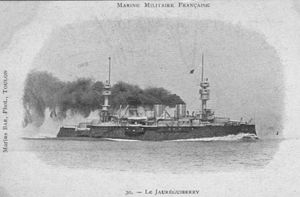French battleship Jauréguiberry
 |
|
| History | |
|---|---|
|
|
|
| Name: | Jauréguiberry |
| Namesake: | Bernard Jauréguiberry |
| Ordered: | 8 April 1891 |
| Builder: | Forges et Chantiers de la Méditerranée, La Seyne-sur-Mer |
| Cost: | 23,385,000 F |
| Laid down: | November 1891 |
| Launched: | 27 October 1893 |
| Completed: | 30 January 1897 |
| Commissioned: | 16 February 1897 |
| Decommissioned: | 30 March 1919 |
| Struck: | 20 June 1920 |
| Fate: | Sold for scrap, 23 June 1934 |
| General characteristics | |
| Type: | Pre-dreadnought battleship |
| Displacement: |
|
| Length: | 111.9 m (367 ft 2 in) |
| Beam: | 23 m (75 ft 6 in) |
| Draught: | 8.45 m (27 ft 9 in) |
| Installed power: | 14,441 ihp (10,769 kW) |
| Propulsion: | 2-shaft vertical triple expansion steam engines, 24 boilers |
| Speed: | 17 knots (31 km/h; 20 mph) |
| Range: | 3,920 nautical miles (7,260 km; 4,510 mi) at 10 knots (19 km/h; 12 mph) |
| Complement: | 597 (1905) |
| Armament: |
|
| Armour: |
|
Jauréguiberry was a pre-dreadnought battleship of the French Navy (French: Marine Nationale), launched in 1893. She was one of the class of five roughly similar battleships built in the 1890s, including Masséna, Bouvet, Carnot, and Charles Martel; Jauréguiberry and the latter two are sometimes erroneously referenced as a single class. She was named after Admiral Bernard Jauréguiberry.
Jauréguiberry was in the Mediterranean when World War I began and she spent most of 1914 escorting troop convoys from North Africa and India to France. She supported French troops during the Gallipoli Campaign in 1915 before she became guardship at Port Said from 1916 for the rest of the war. Upon her return to France in 1919 she became an accommodation hulk until 1932. She was sold for scrapping in 1934.
The Charles Martel group of battleships all shared the same layout for their main and secondary armament—a design that minimised the cramped upper decks produced by the pronounced tumblehome favoured by French designers, and capitalised on the bulging sides of the vessels. The bow and stern turrets had only a single gun and were placed uncomfortably close to the extremities of the ship in Jauréguiberry because she was some 7 metres (23 ft) shorter than the other ships in the group. The single turrets of the secondary armament were mounted on the ship's beam, while the 138-millimetre (5.4 in) guns were mounted in four twin turrets sited symmetrically behind and outboard of the main gun turrets.
Jauréguiberry was 111.9 metres (367 ft 2 in) long overall. She had a maximum beam of 23 metres (75 ft 6 in) and a draught of 8.45 metres (27 ft 9 in). She displaced 11,818 tonnes (11,631 long tons) at normal load and 12,229 tonnes (12,040 long tons) at full load. In 1905 her captain described her as an excellent sea-boat and a good fighting ship, although her secondary armament was too light. He also said that she was stable and well laid-out with good living conditions.
...
Wikipedia
